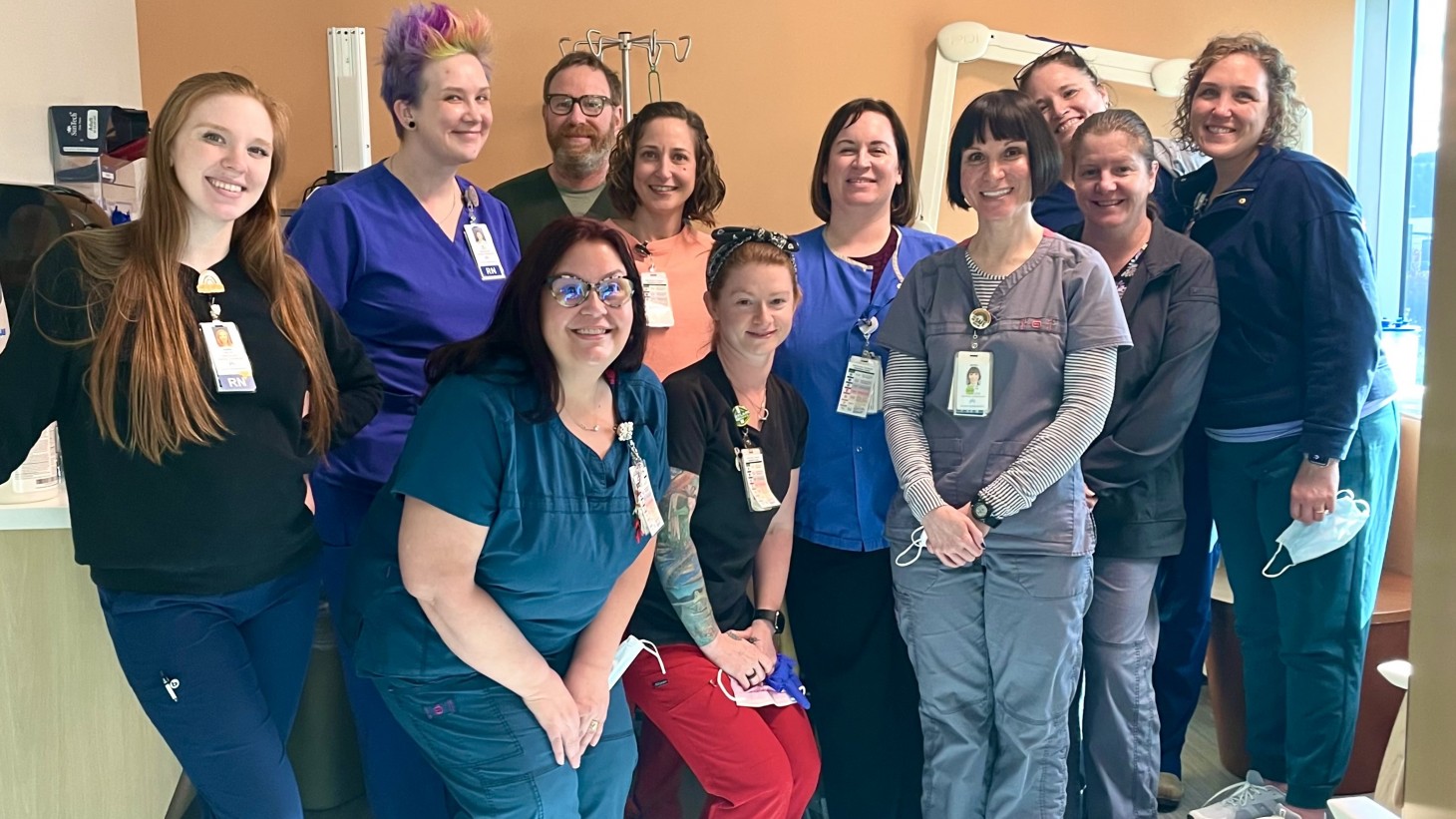
The registered nurses on the Central Interstate Oncology and Infusion Team helped find ways to deliver better care to cancer patients, which also saved money by reducing unnecessary hospitalizations.
Educating staff minimizes patient disruptions, maintains highest quality
Cancer is a scary diagnosis. Patients who receive this devastating news find support and hope from the Central Interstate Oncology and Infusion team.
The Portland-based team manages an infusion clinic where an average of 70 patients receive chemotherapy daily.
Thanks to a UBT project launched in 2023, the team is helping patients better manage chemotherapy side effects. Results have led to a steep drop in the number of patients sent to the hospital because of severe reactions.
The results illustrate the power of the Labor Management Partnership. The project brought together physicians, managers, and frontline staff to find ways to lower hospitalizations and ease the burden on patients.
“This is just one highlight of how amazingly well our cancer team works as a whole,” says Christine Barnett, MD, chief of Oncology at Central Interstate.
Rising hospitalizations
The oncology and infusion unit-based team set out to reduce the number of patients hospitalized for severe chemotherapy reactions.
They began by closely reviewing an unexplained rise in patients receiving infusion treatment in the hospital.
The team found that about half of these patients could have continued with outpatient infusion treatment, which typically lasts 2 to 3 hours. Hospital infusions can take up to 11 hours and involve patient monitoring and additional medication measures.
“It really spoke to the need for providing more thorough onboarding and training and review for existing staff,” says Monica Hahn, manager of Central Interstate’s Cancer Service Line and Medical Oncology back office.
Significant turnover on the team during the COVID-19 pandemic led to gaps in understanding of the different treatment options available to patients, says Hahn, the team’s management co-lead.
The team’s journey pointed to a larger issue as well. During the pandemic, many teams paused important UBT work to meet increased demand for patient care.
The Central Interstate team was no exception. By early 2023, the team had dropped from Level 5 to Level 1 on the Path to Performance as completed UBT projects fell off. The Path to Performance is a five-stage “growth chart” teams use to measure success.
The care experience project marked one step in the team’s renewed focus on UBT work. They returned to Level 5 in just 10 months.
Refreshing skills
To reduce unneeded hospital visits, the team developed a skills refresher for everyone.
Pharmacy staff conducted in-service training to help employees understand the range of medications available to ease difficult side effects.
Unit-based team leaders also received training. They reviewed ways to assess chemotherapy reactions and determine which patients required hospitalization.
The training was led by Dr. Barnett, Chyna Turnbull, a nurse practitioner, and Jennie Burns, a registered nurse, both members of OFNHP Local 5017.
This educational push led team leaders to develop a 2-page handout of clinical practices. Staff members review the information with patients to help them understand expected side effects.
After taking these steps, the team saw hospitalizations for chemotherapy drop by more than 90% over 2 months in 2023. The team continues to maintain the lower level of hospitalizations.
This is good news for patients, who often must pay high deductibles for hospital admissions. And it’s good news for Kaiser Permanente, which is saving an estimated $198,000 annually due to reduced hospitalizations.
Patients also have a better care experience. They develop trusting relationships with infusion team members and maximize recuperation time at home.
“They come in for their treatment and they’re home in time for dinner,” says Burns, the team’s lead registered nurse.
“The patients see that we are all together in this,” says Rebel Herbert, the team’s labor co-lead, who is a medical assistant and member of SEIU Local 49. “We’re always just a phone call or an email message away.”
